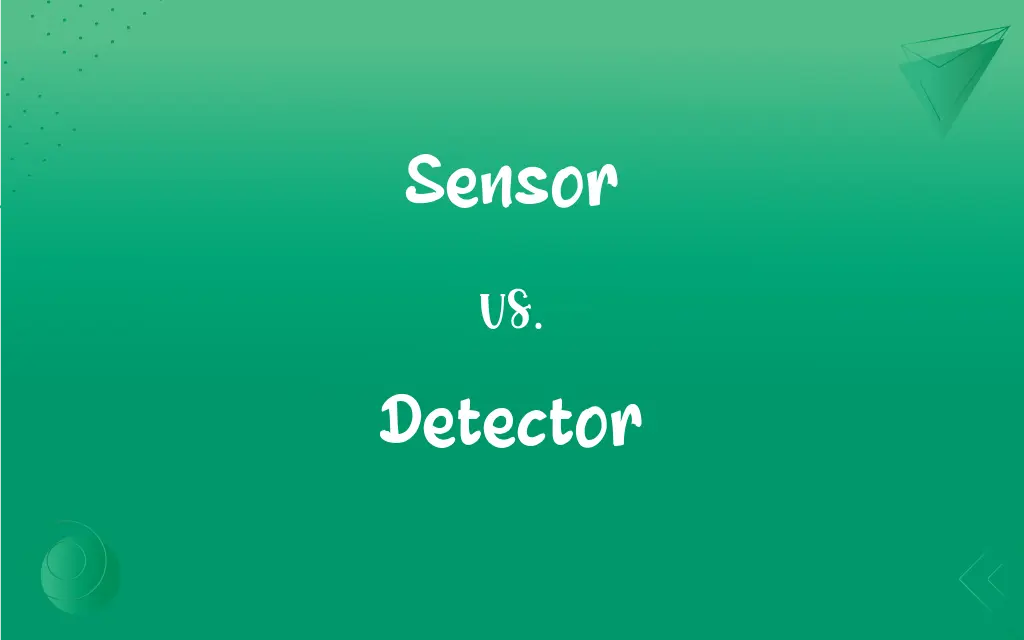Sensor vs. Detector: What's the Difference?
Edited by Harlon Moss || By Janet White || Updated on October 3, 2023
A sensor measures or identifies physical properties or changes, while a detector identifies and alerts to the presence of specific phenomena or substances.

Key Differences
Sensor and Detector are two terms frequently employed in the realm of electronics, science, and engineering. A sensor is a device that responds to physical stimuli (like heat, light, or motion) and converts them into signals that can be read, displayed, or analyzed. Sensors are integral to various systems, serving as the eyes and ears, capturing raw data from the environment. On the contrary, a detector is more about identification and alerting. It is designed to discern specific phenomena or substances and often triggers a response or alarm when such conditions are detected.
Imagine a home security system. A sensor in this system might measure changes in infrared radiation, capturing the presence of motion. However, it's the detector's role to discern if this motion is significant enough, based on predefined criteria, to warrant setting off an alarm. The sensor simply gathers data; the detector makes more of a judgment call based on that data.
In many applications, sensors and detectors work hand in hand. For instance, in a smoke alarm, a sensor might detect particles in the air, while the detector determines if these particles indicate a fire, subsequently sounding an alarm. While sensors focus on the act of measuring or identifying a broad spectrum of changes, detectors are honed to pinpoint specific events or substances.
Another differentiation is in their outputs. Sensors often produce continuous or analog outputs that might require further interpretation. For instance, a temperature sensor might provide a constant reading of ambient temperature. In contrast, a detector, like a metal detector at an airport, gives a more binary output: either there's metal present, or there isn't. The detector's primary purpose is to alert or notify about the presence of specific conditions or substances.
Comparison Chart
Purpose
Measures or identifies physical properties or changes
Identifies and alerts to specific phenomena or substances
ADVERTISEMENT
Output
Often continuous or analog
Typically binary or discrete
Function
Gathers data from the environment
Makes judgments or triggers responses based on sensed data
Examples
Temperature sensor, motion sensor
Smoke detector, metal detector
Interpretation
Outputs might require further processing or interpretation
Typically provides direct, actionable alerts or indications
Sensor and Detector Definitions
Sensor
An instrument that responds to specific stimuli and produces a signal.
The car's parking sensor beeped as it neared the wall.
ADVERTISEMENT
Detector
An instrument that identifies specific conditions and often triggers a response.
The metal detector beeped when he walked through with coins in his pocket.
Sensor
A device that converts physical parameters into electronic signals.
The microphone is a type of sound sensor.
Detector
A tool that discerns and indicates specific events or materials.
The radiation detector measures levels at the nuclear facility.
Sensor
A component that gathers data from the surrounding environment.
The smartphone's light sensor adjusts screen brightness.
Detector
An apparatus focused on pinpointing specific substances or events.
The UV detector in the lab identifies the presence of ultraviolet light.
Sensor
A device that detects and measures a physical property.
The thermostat includes a temperature sensor.
Detector
A device designed to discover the presence of a particular substance or phenomenon.
The gas detector sounded an alarm due to a leak.
Sensor
An apparatus that detects changes in physical quantities.
The camera's image sensor captures photographs.
Detector
One that detects, especially a mechanical, electrical, or chemical device that automatically identifies and records or registers a stimulus, such as an environmental change in pressure or temperature, an electric signal, or radiation from a radioactive material.
Sensor
A device, such as a photoelectric cell, that receives and responds to a signal or stimulus.
Detector
A device capable of registering a specific substance or physical phenomenon, and that optionally sounds an alarm or triggers a warning.
Smoke detectors are mandatory in public buildings.
Sensor
See sense organ.
Detector
An indicator showing the depth of the water in a boiler.
Sensor
A device or organ that detects certain external stimuli and responds in a distinctive manner.
Detector
A galvanometer, usually portable, for indicating the direction of a current.
Sensor
Sensory; as, the sensor nerves.
Detector
One who, or that which, detects; a detecter.
A deathbed's detector of the heart.
Sensor
Any device that receives a signal or stimulus (as heat or pressure or light or motion etc.) and responds to it in a distinctive manner
Detector
An indicator showing the depth of the water in a boiler.
Detector
Any device that receives a signal or stimulus (as heat or pressure or light or motion etc.) and responds to it in a distinctive manner
Detector
Rectifier that extracts modulation from a radio carrier wave
Detector
Electronic equipment that detects the presence of radio signals or radioactivity
Detector
A device that provides alerts based on predefined criteria.
The smoke detector warned of a potential fire.
FAQs
Can a device have both sensors and detectors?
Yes, many devices utilize sensors for data gathering and detectors for specific alerts.
Do all sensors need detectors?
No, not all sensors are paired with detectors; some just provide continuous readings or data.
How does a light sensor work?
A light sensor measures the intensity of ambient light, often using photodiodes or resistive materials.
Are detectors always electronic?
While many modern detectors are electronic, there are mechanical or chemical detectors too.
Why are smoke detectors essential in homes?
Smoke detectors can identify early signs of fire, providing crucial time for evacuation and safety.
How do touch sensors in screens work?
They often use capacitive or resistive technologies to detect touch points and gestures.
What's the difference between a motion sensor and a motion detector?
A motion sensor captures movement data, while a motion detector alerts to specific movements based on set criteria.
Do detectors always make audible alarms?
No, detectors might use visual signals, vibrations, or other means to alert or notify.
Is a sensor the same as a detector?
No, while a sensor measures or identifies changes, a detector alerts to specific phenomena or substances.
How frequently should sensors be calibrated?
It depends on the sensor's application, but regular calibration ensures accuracy and reliability.
Can sensors detect changes in real-time?
Many sensors are designed to provide real-time feedback, but response times can vary.
What powers a metal detector?
Metal detectors often use electromagnetic fields to identify metal objects.
How do infrared detectors identify heat signatures?
They capture radiation emitted by objects, translating it into temperature readings or images.
Are all detectors sensitive to the same thresholds?
No, detectors can have varying sensitivities based on their design and intended use.
How do temperature sensors function?
They often use materials that change resistance or voltage based on temperature variations.
Is calibration crucial for detectors?
Yes, calibrating detectors ensures they respond accurately to the specific conditions they're designed to identify.
Are there detectors for harmful gases?
Yes, there are specific detectors designed to identify and alert to hazardous gases.
Can a sensor measure multiple properties?
Yes, some sensors, like environmental sensors, can measure temperature, humidity, and more.
What powers a carbon monoxide detector?
They can be battery-operated, hardwired, or plugged into outlets, and they detect CO levels in the air.
Can sensors work in harsh conditions?
Some sensors are designed to operate in extreme environments, but they might need protective housings.
About Author
Written by
Janet WhiteJanet White has been an esteemed writer and blogger for Difference Wiki. Holding a Master's degree in Science and Medical Journalism from the prestigious Boston University, she has consistently demonstrated her expertise and passion for her field. When she's not immersed in her work, Janet relishes her time exercising, delving into a good book, and cherishing moments with friends and family.
Edited by
Harlon MossHarlon is a seasoned quality moderator and accomplished content writer for Difference Wiki. An alumnus of the prestigious University of California, he earned his degree in Computer Science. Leveraging his academic background, Harlon brings a meticulous and informed perspective to his work, ensuring content accuracy and excellence.
































































